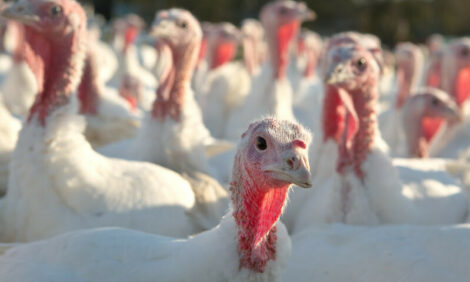



Sustainable Intensification to Meet Growing Demand
ANALYSIS - Growth in the global population of 35 per cent by 2050, with 70 per cent of this population living in urban areas will produce greater and greater demand for food, writes Chris Harris.However, this increase in food production has to be confronted in the face of climate change while at the same time reducing the carbon cost of farming without taking more land.
This will mean that food production will need the same area of land to be farmed, while increasing yields and consequently an intensification of production.
The concept of sustainable intensification - growing or even maintaining production while minimising inputs and enhancing ecosystem services - was addressed on both sides of the Atlantic last week.
In the UK, during the National Farmers' Union annual conference, Prof Tim Benton, professor of ecology at the University of Leeds and UK Champion of Global Food Security said that a cost benefit analysis highlight that the environmental costs of all nitrogen losses in Europe (estimated at between €70 and €320 billion a year), outweighs the direct economic benefits of nitrogen in agriculture.
He said that the goods people rely upon come from an arrangement of service.
"Production of crops is underpinned by a whole range of services," Prof Benton said.
He said that management of ecology is important to agricultural production and conservation of water, climate change and carbon storage are all important to society.
"We have to think more in the round - about the environmental aspects of sustainable intensification."
He said that the message for sustainable intensification is doing more with less - managing soils for production, managing their fertility and controlling erosion and soil health.
Doing more with less also includes managing non-cropped areas for beneficial organisms, reducing wasteful inputs through innovation and recycling and genetic improvements.
However, he added that genetic improvements do not necessarily mean genetic modification, but the development of plants and animals using standard genetic techniques.
He said that sustainable agriculture is more than field management, it is a property of the whole systems.
Prof Benton added that looking at extensive or organic systems may not be the sole solution to sustainability and it might not be just looking at food miles. Balancing carbon footprints is part of the solution, as importing product grown in tropical regions could has a smaller footprint compared to growing crops in heated greenhouses.

At the same time in the US, Neil Conklin the president of Farm Foundation told the USDA Agricultural Outlook Forum that scientific advances have the potential to bring forward technologies that boost productivity and take into account both resources scarcities and environmental problems.
He said the vision for sustainable intensification included the two scenarios of large farms driven by technology connected to consumers through global supply chains and small sustainable farms connected to consumers through local food networks.
He said that a truly sustainable agriculture will need to meet growing demand while incorporating the external environmental and social costs of agricultural production.
He said that changes in behaviour and productivity are going to be required.
Increases in agricultural output - the Total Factor Productivity (TFP) - can come either from growth in resource use (natural land and water) or from increases in yield, he said.
He said this can be achieved through intensification of inputs or the result of technological change and institutional innovations.
"Viewed strictly from a productivity point of view it doesn't matter whether increased TFP results from agro-ecological methods or improved varieties that result from biotechnology," he said.
"The environmental and social effects of new technologies must still be evaluated in the context of the imperatives for increasing productivity."
He added: "Clearly limiting agriculture's impact on the environment means limiting our reliance on increased area and increases in the intensity of input use.
"While reduction in waste and changes in our food tastes and preferences will help to meet the challenges of a growing world, we will be heavily reliant on increases in productivity.
"Science is at the heart of increased productivity and we can ill afford to reject out of hand the tools that it has to offer.
"However, that does nor absolve us from the responsibility to evaluate not only the benefits of increased productivity resulting from technological innovation but also the social and environmental consequences, both positive and negative.
"Even more importantly many of today's innovations, whether they are coming from agro-ecology or from modern biotechnology are heavily dependent on management skills and ever higher levels of human capital."








